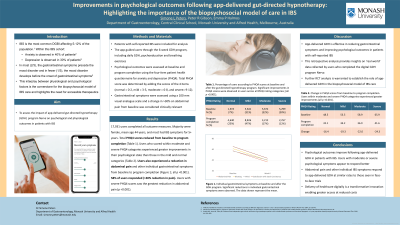Tuesday Poster Session
Category: Functional Bowel Disease
P3382 - Improvements in Psychological Outcomes Following App-Delivered Gut-Directed Hypnotherapy: Highlighting the Importance of the Biopsychosocial Model of Care in IBS
Tuesday, October 24, 2023
10:30 AM - 4:00 PM PT
Location: Exhibit Hall

Has Audio
- SP
Simone Peters, PhD
Monash University
Melbourne, Victoria, Australia
Presenting Author(s)
Simone Peters, PhD, Peter Gibson, , Emma Halmos, PhD
Monash University, Melbourne, Victoria, Australia
Introduction: Anxiety and depression are observed in 40% and 30% of IBS patients, respectively. In two-thirds, the gastrointestinal symptoms precede the mood disorder and in one-third, the mood disorder develops before the onset of gastrointestinal symptoms. This interplay between physiological and psychological factors is the cornerstone for the biopsychosocial model of IBS care and highlights the need for accessible therapeutics targeted towards improving both physical and psychological outcomes. Aim: To assess the impact of app-delivered gut-directed hypnotherapy program, Nerva, on psychological and physical outcomes in IBS.
Methods: Patients with self-reported IBS were included for analysis. The app guided users through the 6-week gut-directed hypnotherapy program, including daily gut-directed hypnotherapy, psychoeducation and breathing exercises. Psychological outcomes were assessed at baseline and program completion using the four-item patient health questionnaire for anxiety and depression (PHQ4). Total PHQ4 score was determined by adding the scores of the 4 items (normal = 0-2, mild = 3-5, moderate = 6-8, and severe = 9-12). Gastrointestinal symptoms were assessed using a 100 mm visual analogue scale (VAS) and a change in >30% on abdominal pain from baseline was considered clinically relevant.
Results: 17,931 users completed all outcome measures. Majority were female, mean age 44 years, and most had IBS symptoms for 5+ years. Total PHQ4 scores reduced from 6.2 (moderate) at baseline (95% CI 6.1-6.2) to 3.8 (mild) at program completion (3.8-3.9); (p< 0.001). Users who scored within moderate and severe PHQ4 categories experienced greater improvements to their psychological state than those in the mild and normal categories (Table 1). Users also experienced a reduction in abdominal pain from 57 mm (95% CI 57-58) at baseline to 37 mm (36-37) at program completion (p< 0.001). 58% of users responded ( >30% reduction in pain). Users with severe PHQ4 scores saw the greatest reduction in abdominal pain from 69 mm at baseline to 45 mm at program completion (p< 0.001).
Discussion: App-delivered gut-directed hypnotherapy improves not only physical symptoms but also psychological outcomes in patients with self-reported IBS. Users with moderate and severe PHQ4 scores tend to respond better. App-delivered gut-directed hypnotherapy offers an accessible and affordable management strategy amongst IBS populations and is backed by a biopsychosocial model of care.
Disclosures:
Simone Peters, PhD, Peter Gibson, , Emma Halmos, PhD. P3382 - Improvements in Psychological Outcomes Following App-Delivered Gut-Directed Hypnotherapy: Highlighting the Importance of the Biopsychosocial Model of Care in IBS, ACG 2023 Annual Scientific Meeting Abstracts. Vancouver, BC, Canada: American College of Gastroenterology.
Monash University, Melbourne, Victoria, Australia
Introduction: Anxiety and depression are observed in 40% and 30% of IBS patients, respectively. In two-thirds, the gastrointestinal symptoms precede the mood disorder and in one-third, the mood disorder develops before the onset of gastrointestinal symptoms. This interplay between physiological and psychological factors is the cornerstone for the biopsychosocial model of IBS care and highlights the need for accessible therapeutics targeted towards improving both physical and psychological outcomes. Aim: To assess the impact of app-delivered gut-directed hypnotherapy program, Nerva, on psychological and physical outcomes in IBS.
Methods: Patients with self-reported IBS were included for analysis. The app guided users through the 6-week gut-directed hypnotherapy program, including daily gut-directed hypnotherapy, psychoeducation and breathing exercises. Psychological outcomes were assessed at baseline and program completion using the four-item patient health questionnaire for anxiety and depression (PHQ4). Total PHQ4 score was determined by adding the scores of the 4 items (normal = 0-2, mild = 3-5, moderate = 6-8, and severe = 9-12). Gastrointestinal symptoms were assessed using a 100 mm visual analogue scale (VAS) and a change in >30% on abdominal pain from baseline was considered clinically relevant.
Results: 17,931 users completed all outcome measures. Majority were female, mean age 44 years, and most had IBS symptoms for 5+ years. Total PHQ4 scores reduced from 6.2 (moderate) at baseline (95% CI 6.1-6.2) to 3.8 (mild) at program completion (3.8-3.9); (p< 0.001). Users who scored within moderate and severe PHQ4 categories experienced greater improvements to their psychological state than those in the mild and normal categories (Table 1). Users also experienced a reduction in abdominal pain from 57 mm (95% CI 57-58) at baseline to 37 mm (36-37) at program completion (p< 0.001). 58% of users responded ( >30% reduction in pain). Users with severe PHQ4 scores saw the greatest reduction in abdominal pain from 69 mm at baseline to 45 mm at program completion (p< 0.001).
Discussion: App-delivered gut-directed hypnotherapy improves not only physical symptoms but also psychological outcomes in patients with self-reported IBS. Users with moderate and severe PHQ4 scores tend to respond better. App-delivered gut-directed hypnotherapy offers an accessible and affordable management strategy amongst IBS populations and is backed by a biopsychosocial model of care.
Disclosures:
Simone Peters: Mindset Health – Advisory Committee/Board Member, Consultant, Grant/Research Support, Stock Options.
Peter Gibson: Anatara – Advisory Committee/Board Member. Atmo Biosciences – Advisory Committee/Board Member, Consultant, Grant/Research Support, Stock Options. Comvita – Advisory Committee/Board Member. Dr Falk Pharma – Speakers Bureau. Intrinsic Medicine – Advisory Committee/Board Member. Mindset Health – Grant/Research Support. Topas – Advisor or Review Panel Member.
Emma Halmos: Mindset Health Pty Ltd – Grant/Research Support. Sandoz Pty Ltd – Speakers Bureau.
Simone Peters, PhD, Peter Gibson, , Emma Halmos, PhD. P3382 - Improvements in Psychological Outcomes Following App-Delivered Gut-Directed Hypnotherapy: Highlighting the Importance of the Biopsychosocial Model of Care in IBS, ACG 2023 Annual Scientific Meeting Abstracts. Vancouver, BC, Canada: American College of Gastroenterology.

